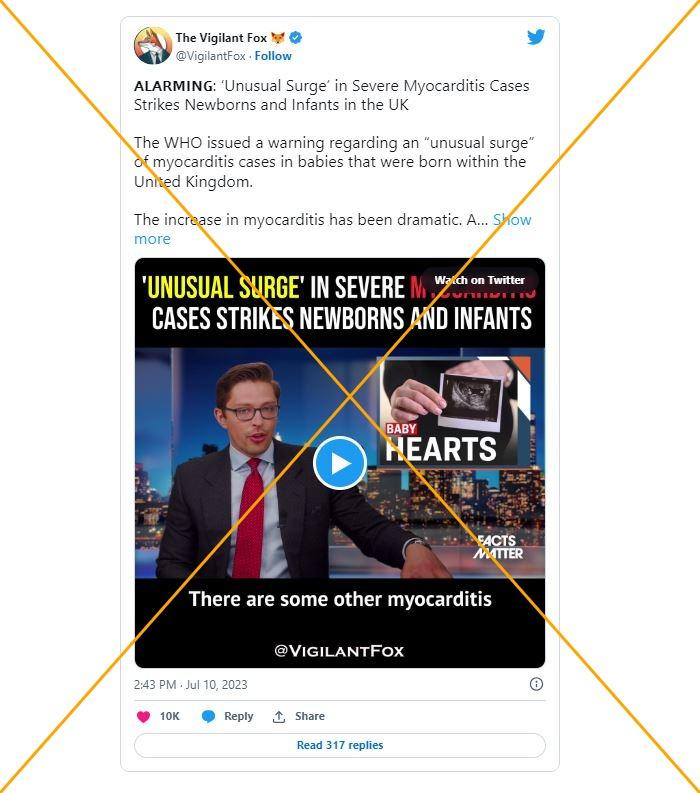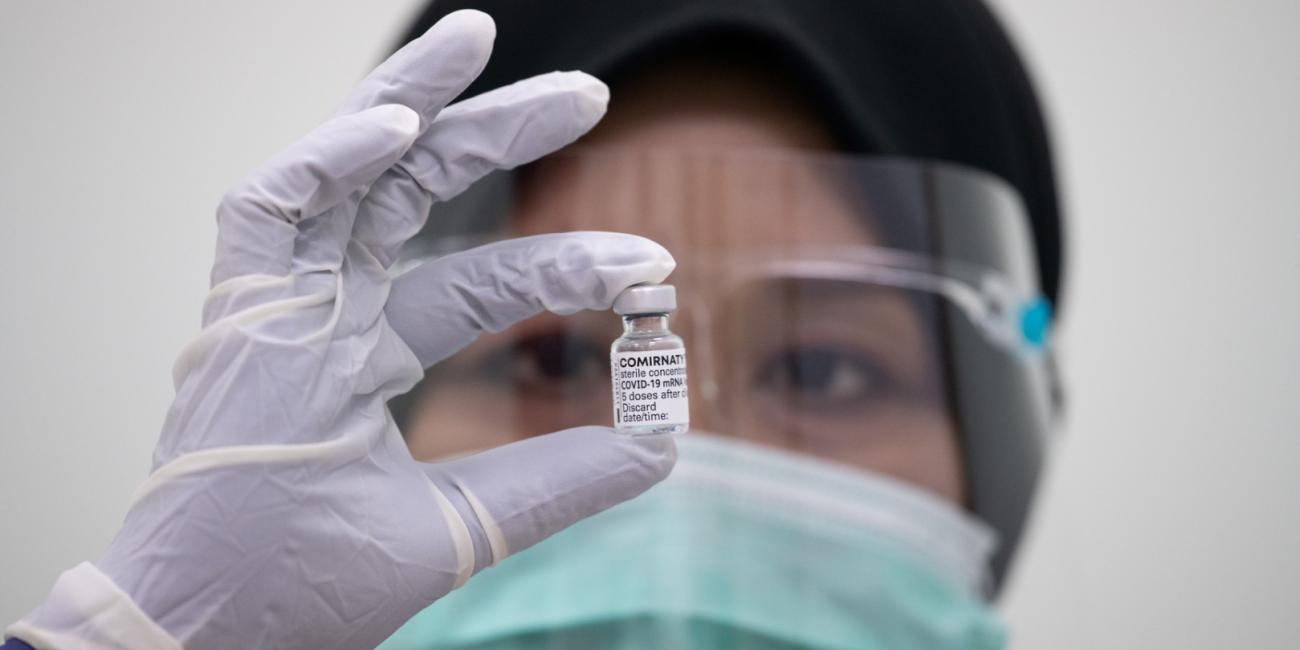
UK infant myocarditis cases unrelated to Covid vaccination
- This article is more than two years old.
- Published on July 13, 2023 at 16:51
- Updated on July 14, 2023 at 16:50
- 3 min read
- By Daniel FUNKE, AFP USA
"The (World Health Organization) issued a warning regarding an 'unusual surge' of myocarditis cases in babies that were born within the United Kingdom," says a July 10, 2023 tweet with thousands of interactions.
"A hospital in the South Wales region reported only one myocarditis case in infants and newborns over the past six years. However, over a span of less than a year, between June 2022 and April 2023, 'ten babies under 28 days of age presented with symptoms of myocarditis' at that same hospital."
The post shares a clip from an Epoch Times show hosted by Roman Balmakov. The website, backed by the Falun Gong Chinese spiritual movement, has previously spread misinformation about the coronavirus pandemic.
"Now I know what you're thinking at this point: What could have possibly led to this increase in myocarditis cases in babies during the years 2022 to 2023?" Balmakov says in the video shared online. "Could it have anything to do with the large-scale push to get everyone in the country -- including pregnant women -- fully vaccinated?"

Similar theories have circulated in multiple languages on Twitter, Facebook and Instagram, as well as websites such as Zero Hedge, which has previously promoted misinformation.
The World Health Organization (WHO) said in a May 16, 2023 statement (archived here) that, starting in summer 2022, there was an increase in "severe myocarditis" among children in the United Kingdom.
But the statement makes no mention of Covid-19 vaccination, as Balmakov notes in his original July 8 segment. Instead, it says the reported spike in myocarditis was "associated with enterovirus infection in Wales" -- context the social media posts omit.
"Although enterovirus infections are common in neonates and young infants, the reported increase in myocarditis with severe outcomes in neonates and infants associated with enterovirus infection is unusual," the WHO said.
The agency told AFP in a July 11 email that Covid-19 vaccination is linked to "some cases of heart inflammation, called myocarditis and pericarditis." But myocarditis is far more common following infection.
"The Covid-19 (vaccine) is the best way to protect yourself against serious illness," said Emma O'Brien, a spokesperson for the UK Health Security Agency (UKHSA), in a July 11 email.
Enterovirus cases
Between June 2022 and March 2023, 15 newborns and young infants "presented with a picture consistent with neonatal sepsis in Wales and Southwest England," the WHO said in its May statement. Testing confirmed nine cases of enterovirus.
Enteroviruses are different from coronaviruses, spreading primarily through contact with bodily secretions instead of airborne particles. Enteroviruses are common and mostly affect babies, children and teenagers, according to Cedars-Sinai Medical Center in Los Angeles.
"The viruses may not cause any symptoms, or they may cause only mild symptoms," the hospital says on its website (archived here). "But in some cases, an enterovirus can be more severe and cause complications. Some of the viruses, such as polio, can cause serious illness."
The WHO said in its statement that in each enterovirus case where the child lived, myocarditis was "a presenting factor." The peak incidence occurred in November 2022.
Preliminary investigations "have not identified any other clusters in any other region beyond those in South Wales and Southwest England in the United Kingdom in the past 12 months," the agency said.
"Based on the limited information available at this point, WHO assesses the public health risk as low."
O'Brien of the UKHSA said enterovirus "is already known in rare circumstances to cause myocarditis in very young babies." The WHO says on its website (archived here) that viral infections are the most common cause of the heart condition, whose symptoms include chest pain, shortness of breath and heart palpitations.
Despite rare cases of myocarditis and Covid-19 vaccination, O'Brien said "large-scale studies worldwide have found no evidence of any increased risk of myocarditis in infants of mothers who were vaccinated against Covid-19 in pregnancy." Such cases have occurred most frequently in young males with a second dose of a messenger RNA (mRNA) shot, according to the US Centers for Disease Control and Prevention (archived here).
"Documentation of possible cases and outcomes is important for continued safety surveillance of mRNA vaccines," says an August 2022 study on Covid-19 vaccination and pregnancy (archived here). "Reassuringly, in the hitherto published literature, there is no report of vaccine-associated myocarditis in the pregnant people."
Covid-19 vaccines are "strongly recommended in pregnancy" by the Royal College of Obstetricians and Gynaecologists.
The American College of Obstetricians and Gynecologists also recommends pregnant people get vaccinated against Covid-19, saying on its website (archived here) that a "growing body of observational data so far have not identified any safety concerns for Covid-19 vaccination during pregnancy."
AFP has fact-checked other false and misleading claims about vaccines here.
July 14, 2023 This article was updated in the fifth and eighth paragraphs with additional context from the Epoch Times's original segment.
Copyright © AFP 2017-2026. Any commercial use of this content requires a subscription. Click here to find out more.
Is there content that you would like AFP to fact-check? Get in touch.
Contact us




